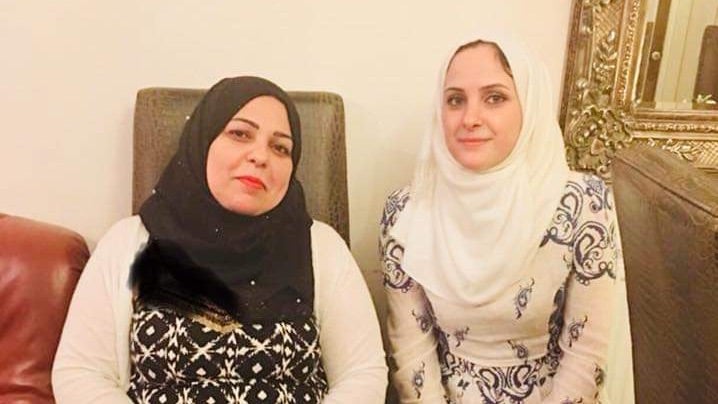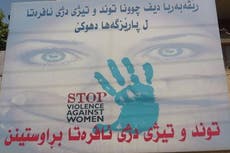Double murder of mum and daughter exposes safeguarding measures ‘not worth paper they are written on’
‘Janbaz’s ultra-conservative religious and cultural beliefs viewed women as men’s property. He would have regarded the murders as restoring his so-called ‘honour’ following Raneem’s refusal to conform,’ campaigner says

The double murder of a mother and daughter exposes laws and safeguarding measures designed to keep women safe are “not worth the paper they are written on”, warned campaigners.
An inquest at Birmingham Coroner’s Court into the deaths of Khaola Saleem, who was 49, and Raneem Oudeh, her 22-year-old daughter, started on Monday - with the inquest examining the role of police, social services and other arms of the state before the murder took place.
The mother and daughter were stabbed to death by Janbaz Tarin, the second husband of Raneem, outside the home of Khaola in Solihull, a town near Birmingham, in August 2018.
Raneem’s murder came after a “horrific campaign of escalating domestic violence, honour-based abuse and stalking” from Tarin, the Centre for Women’s Justice, a legal charity which tackles violence against women, said.
He harassed and intimidated her into marrying him in an Islamic ceremony back in April 2017, with Tarin, who came from a fundamentalist Afghani Muslim background, telling her: “We don’t have divorce in our culture. The day that you will be free from me is the day I will kill you.”
Raneem applied for a non-molestation order against her husband which was enforced on him but the police had yet to be presented with it.
Non-molestation orders, which can last up to a lifetime, often restrict where abusers can go or whom they can approach, and can be used to prevent a partner or ex-partner from using or threatening violence against a victim or their child.
The orders are obtained via the civil courts, with many domestic abuse victims taking action against abusers through the civil courts rather than the criminal system because it is a less distressing and less protracted process.
Harriet Wistrich, director of the Centre for Women’s Justice, said: “Whilst there are laws, policies and a range of protective measures available to protect women from male violence, as our police super-complaint has shown, time and again we see, as in this tragic case, they are not worth the paper they are written on.
“We hope by shining a light on what went wrong the inquest into this horrendous loss of life, will help galvanise transformational change”.
Tarin, who had one child with Raneem, acted as if he owned her like a possession, assaulting her and raping her in their relationship, as well as perpetrating coercive control.
Reports of violence meant police had been called to the home they lived in together a number of times - with Raneem attempting to flee Tarin, who was on probation at the time, more than once during their relationship.
Tarin once sent her a photo of his forearm which he had carved her name into - with Raneem perceiving this to be a death threat.
Khoala and Raneem had gone to a nearby shisha bar where Tarin tried to assault both of the women on the night of the murder. He was kicked out from the bar and could be seen miming a slicing motion across his throat.
Raneem rang the police and told them of the non-molestation order she had against him but the officers never turned up to help while the pair waited for them at the shisha bar. The pair finally gave up waiting and made their way to Raneem’s flat, but discovered they could not get inside due to not having keys.
Raneem and Khoala were very frightened Tarin might locate them so they rang the police three more times. But police officers ceased to arrive and recommended they go to Khaola’s house and lock the doors.
Upon getting to Khaola’s house, the police rang them to say they would come and see them in the morning. While Raneem was talking to the police via phone, Tarin repeatedly stabbed her, with Khaola dying while seeking to protect her daughter from Tarin.
Three days later, Tarin was arrested, before going on to be convicted of the double murder in 2018 and sentenced to life in prison, with a 32 year minimum.
Nour Norris, who is Ms Khaola’s sister, said: “I am so relieved that finally after four long years of waiting, the inquest into the deaths of my beloved sister Khaola and her beautiful daughter Raneem, my niece, is starting.”
She added that she “hoped” the inquest would secure justice for her deceased relatives but also called for it to “raise awareness of the danger that domestic abuse and coercive control poses to all women but particularly those from different ethnicities and cultures.”
Ms Norris, who was Raneem’s aunt, added: “Violence against women must always be taken seriously.”
Dr Hannana Siddiqui, of Southall Black Sisters, which supports black and minority ethnic women, said: “Janbaz’s ultra-conservative religious and cultural beliefs viewed women as men’s property.
I am so relieved that finally after four long years of waiting, the inquest into the deaths of my beloved sister Khaola and her beautiful daughter Raneem, my niece, is starting.
“He would have regarded the murders as restoring his so-called ‘honour’ following Raneem’s refusal to conform.
“The police failed to take the threat to life seriously, despite increased public awareness and professional training in the last two decades following the ‘honour killings’ of many others, including that of Banaz Mahmod in 2006 when the police did not protect her in the name of ‘cultural and religious sensitivity’. It is time to end this heinous crime.”
While Selen Cavcav, a senior caseworker from Inquest, said the key issue is why “all the systems” designed to “safeguard women from violence fell by the wayside resulting in the shocking deaths of two women from minoritised communities”.
Join our commenting forum
Join thought-provoking conversations, follow other Independent readers and see their replies
Comments


Bookmark popover
Removed from bookmarks